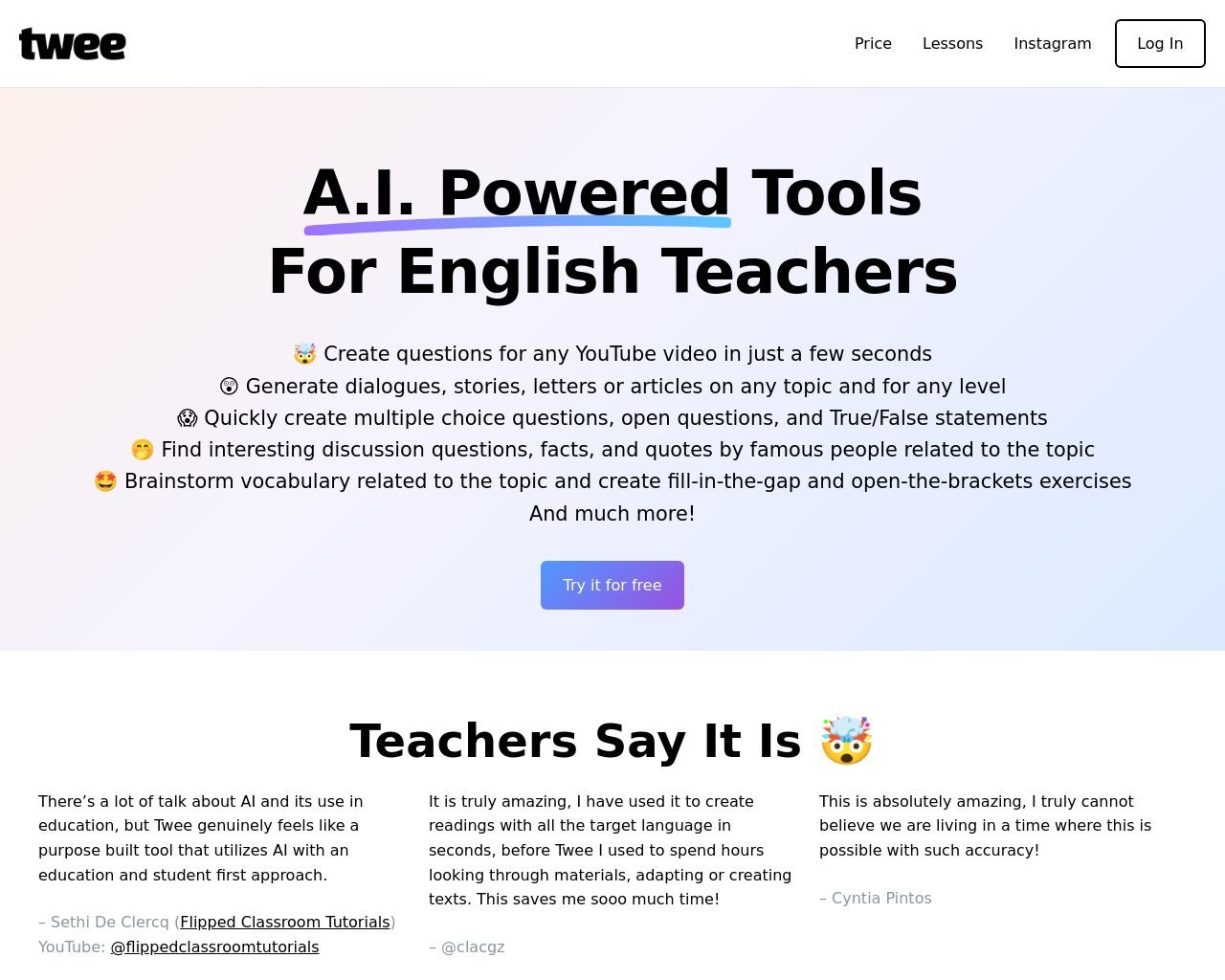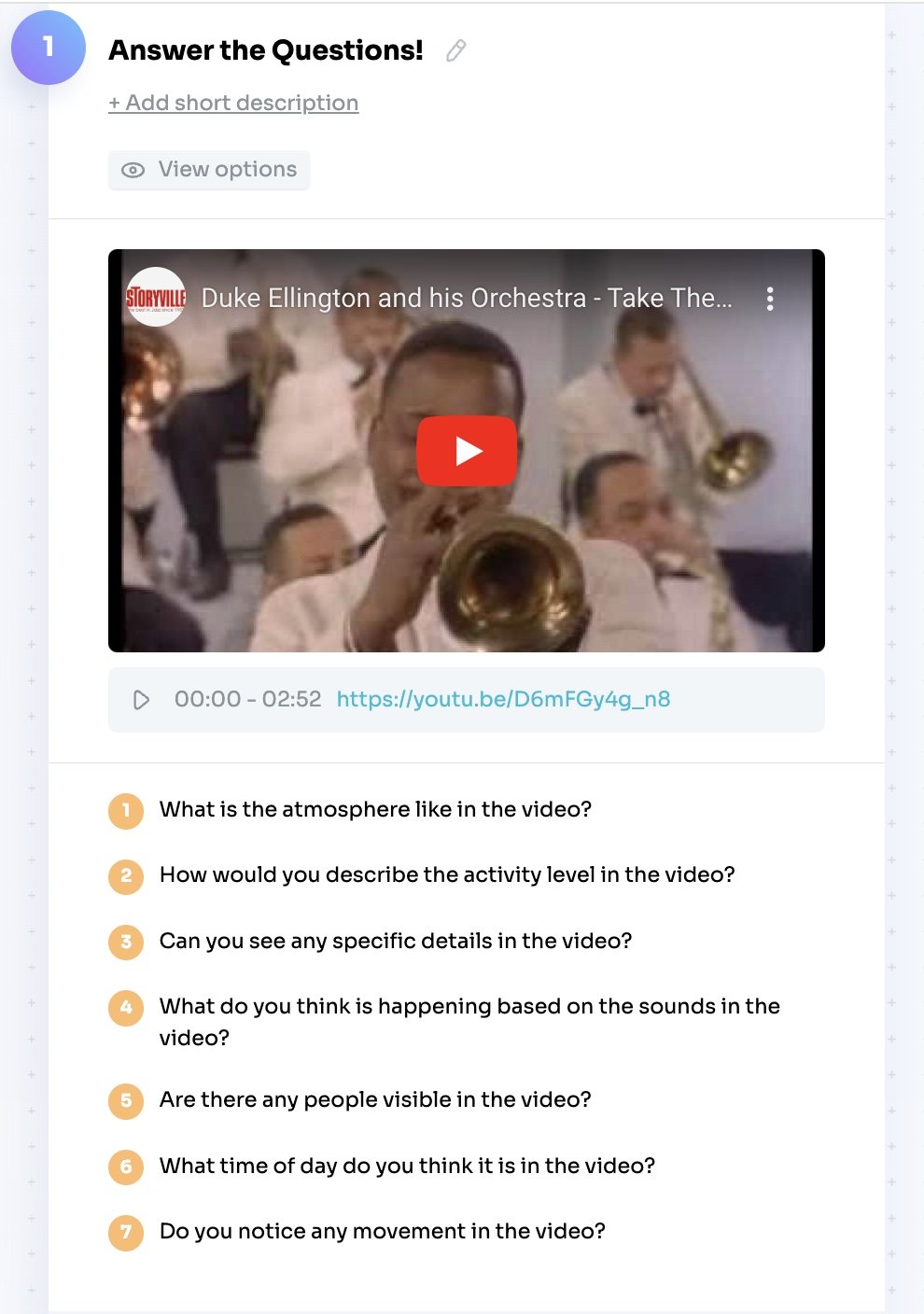Meet Twee! It’s not just for English teachers
I recently stumbled across an AI tool for English teachers called Twee that is actually really useful for any teacher - including music teachers! This multi-function AI powered tool allows you to do LOTS of different things - from lesson planning to creating assessments. While there are a ton of features that are specific to writing, vocabulary and grammar, there are some features that I think music teachers will love using. My favorite is the ability to analyze ANY video and create assessments with a variety of options. From being able to generate multiple choice to open ended questions, this is a time saver and I recommend checking it out to see whether you might be able to use it with your students. Here are a number of examples of how I think it could be used with any music program.
There are over 30 tools to choose from, the Watch and Listen tools are the one that I would like to focus on. What Twee does is allow users to submit a link to any video on sites like YouTube. I decided to try it out with a couple of all-time favorite videos for music students to see what it produced. First I chose the video that features Leonard Bernstein where he breaks down key components of music in 6 minutes from his famous lecture series, The Unanswered Question. Here is the video:
When I opened up the Audio & Video Question Generator tool and entered the URL of the video.
After doing so, I selected the ABCD questions (you can also select Open questions or True/False statements) and then selected the Intermediate level (you can also select Simple or Advanced) and Twee generated the following questions (and answers):
Here are all 7 questions:
1. What type of musical development is the speaker describing in the video?
A. The evolution of musical styles from prehistoric times to the present day
B. The gradual addition of intervals to the harmonic series
C. The increasing complexity of musical compositions over time
D. The expansion of the chromatic scale through the circle of fifths
2. According to the speaker, what was the first interval added to the octave in the development of music?
A. The fifth
B. The fourth
C. The third
D. The second
3. What was the significance of the introduction of the third interval in music?
A. It led to the development of polyphony
B. It established the tonic-dominant relationship
C. It created a more mellow and colorful sound
D. It expanded the circle of fifths
4. What is the speaker's description of the "circle of fifths" in the video?
A. A sequence of twelve keys generated by the chromatic scale
B. A pattern of alternating tonic and dominant chords
C. A progression of twelve different tones through the circle of fifths
D. A framework for modulating between different keys
5. What is the speaker's prediction about how "Fair Harvard" might sound in the future?
A. It will become more dissonant and chromatic
B. It will retain its traditional harmonic structure
C. It will incorporate more complex polyphonic elements
D. It will be performed in a wider range of keys
6. What is the primary purpose of the speaker's explanation of musical development in the video?
A. To provide a historical overview of the evolution of music
B. To demonstrate the mathematical principles underlying music theory
C. To illustrate the gradual enrichment of the musical vocabulary
D. To argue for the superiority of classical music over modern forms
7. What is the most likely reason the speaker uses the example of "Fair Harvard" in the video?
A. To highlight the popularity of traditional college songs
B. To contrast the simplicity of the song with more complex music
C. To provide a familiar reference point for the audience
D. To emphasize the universal appeal of traditional melodies
Pretty amazing, huh? I decided to try something different - this time a musical performance by Duke Ellington and his band performing Take The A Train.
Not as specific as I wanted, so I asked for ABCD Questions and chose the Intermediate level. Here are the questions it generated:
What type of musical ensemble is the focus of the video transcript?
a String ensemble
b Woodwind ensemble
c Big band
d Percussion group
Which word from the transcript best describes the sound quality of the band?
a Harmonious
b Mellow
c Shrill
d Devious
What can be inferred about the performance style of the band based on the transcript?
a It is a traditional, formal performance.
b It is an experimental, avant-garde performance.
c It is a high-energy, energetic performance.
d It is a somber, reflective performance.
Which of the following is not a characteristic of the band described in the transcript?
a Sharp
b Performative
c Melodic
d Brass
What is the overall impression of the brass band performance conveyed in the transcript?
a Negative and critical
b Positive and enthusiastic
c Neutral and detached
d Nostalgic and sentimental
Based on the transcript, which genre of music does the band's performance seem to incorporate?
a Classical
b Jazz
c Marching band
d Rock
What can be inferred about the audience's reaction to the band performance from the transcript?
a The audience was engaged and appreciative.
b The audience was confused and disinterested.
c The audience was divided in their reactions.
d No information is provided about the audience's reaction.
Are these questions perfect? Not really, but they DO provide you with a HUGE head start. You can easily copy and then edit the questions and insert them into either a MusicFirst Classroom assessment or a Google Form to generate an assessment for your students. If you use Twee with another amazing tool like EdPuzzle, you really have lots of great time-saving tools to get you started.
I think that Twee is a good example of how an AI tool can help you teach. I highly recommend signing up for a FREE account and testing it out for your own uses. There are lots of other tools that you might useful as well. Hopefully you will find them as useful as I do!




